What to Do If You Have a Skunk Problem
Homeowners always need to take care to avoid problems with local pests. Whether it’s raccoons, insects, bats, or skunks, it’s generally a good idea to stay vigilant to avoid letting any wildlife get a foothold in your home. However, sometimes skunks and other pests can get past your defences and make themselves at home. Identifying a skunk problem early can be vital in nipping the infestation in the bud before it has time to get worse.
Most people are wary of skunks mainly because of their notorious, foul-smelling spray. The spray can create an unpleasant odour which can also cause intense discomfort if it gets in the mouth or eyes. Skunks don’t use this deterrent as often as most people think (it’s generally used as a last resort). That said, it still isn’t a picnic if you should be sprayed. Skunks can also make nuisances of themselves in other ways, including:
- Demolishing the garden
- Digging unsightly holes in the search for food
- Foraging your garden
- Invading the house
- Burrowing under patios or crawl spaces
- Carrying diseases
As an aside, the spray can be tricky to remove, adding to the notoriety of skunks. Whether it’s gotten on your skin or in the house, the smell can linger and make itself known long after the initial spraying. In case of a skunk problem, take steps to take care of the problem immediately to prevent any escalation.
Why Do Skunks Invade?
Understanding pest behaviour is a good place to start. When it comes to prevention and removal, it can help to find out the pest’s ins and outs. For example, before undergoing bat removal, keep an eye out for bat guano, especially near any holes and cracks. In the case of skunks (and many other pests), the usual reasons include food and shelter. Skunks usually seek shelter during the winter (generally in December or January). There are other times when skunks need a place to stay. During early spring, skunks start breeding season, meaning an invading skunk may have young.
Signs Of A Skunk Infestation
Skunks are the kind of pests that you’ll probably smell before you see. Be on guard for faint, musky smells (particularly near woodpiles or under the house). Skunks may also try foraging for food in your yard. Keep an eye out for small, shallow holes. These are signs the skunk has been digging for grubs. Sometimes, you may also see damage to plants (e.g. plants knocked-over or damage to low-hanging leaves). Be vigilant for anything out of the ordinary to help you identify a problem.
If you do encounter skunks, they usually aren’t an immediate threat. Skunks are relatively easy-going, and are unlikely to bother people if left alone. However, skunks will defend themselves if they (or their young) feel threatened. They tend to try deterrence before resorting to the spray. Skunks usually try to warn threats away stamping their front feet, hissing, raising their tails, charging forward slightly, or twisting their rear ends in your direction. Move slowly and quietly away to avoid spooking the skunk.
If you keep dogs, keep them restrained. Dogs may ignore these warnings, leading to their being sprayed. In case of a skunk problem, put your dogs someplace safe for their own good.
Dealing With Problem Skunks
When it comes to taking care of an infestation, trapping and removing skunks is the best bet. Leave this one to the pros. Given a skunk’s spray, it’s very likely you can be sprayed yourself in the course of trying to remove one. This is especially probable in the event the skunks have set themselves up below the house.
As with other pests, it’s usually a better idea to avoid an infestation in the first place. Many techniques used to deter other pests (e.g. raccoons and rodents) are effective in preventing a skunk invasion as well. Try these methods to keep skunks out and defend your home from an infestation.
- Remove food sources – One easy way of keeping skunks away is denying them easy access to food. Your trash cans will help keep pests from sniffing and reaching the food, but take some extra precautions. Tie your trash bags before setting them in the cans to add another layer of protection for your trash.
Don’t leave pet food around (especially if you have messy eaters for pets). Clean up any spills and messes immediately; the smell of food can attract plenty of pests besides skunks.
If you have plants that produce fruits, berries, or nuts in your garden, remove any fallen food before they can attract more animals. Remove any water sources (e.g. puddles) that skunks may use for drinking as well.
- Employ lights – Here’s a trick that works well for skunks and raccoons. Try installing lights that can deter skunks from wandering in on your yard. Skunks are nocturnal creatures, with bad eyesight to boot. Sudden lights may startle them into looking for food elsewhere. For extra effectiveness, consider installing motion-detector lights to reduce your energy costs. These lights only activate when they pick up motion, like the appearance of pests. When used with other deterrents, they may be able to scare off skunks before they use your house as a shelter.
- Use your sprinklers – Your sprinklers can also work like lights to deter skunks and other pests. Automated sprinklers can be installed with motion detectors to turn them on when they detect skunks, spraying the pests and startling them. The idea is that the skunks associate the sudden shock with your yard and learn to stay away. Arrange your sprinklers in the garden to deter skunks from searching for food. It can also be a way for you to get some extra watering for your plants, so there’s that.
- Put up effective barriers – When it comes to deterring pests, one good method is sealing any holes to prevent entry inside. Skunks are poor climbers, and an obstacle in the right place may keep them gaining further admission.
Skunks are, however, good diggers, and it can take some extra work to secure the house. Use mesh wire to prevent skunks from digging under any barriers and forcing their way in. Set your mesh barriers at least 30 centimetres deep to deter digging attempts. Skunks may also wander into garages or sheds if there are holes or open doors. Secure all your outbuildings to avoid giving skunks another place to stay.
- Prepare your lawn – Skunks can make a nuisance of themselves even if you’ve kept them out of the house proper. To secure your garden against skunks digging for food, lay bird netting over the affected area. Bunch the mesh along the edges (like you would a curtain). The hills and valleys in the netting can discourage skunks from stepping foot on the area, similar to the effect it has on birds.
The easiest way to take care of an immediate pest problem is removal. At Liddle Rascals Wildlife Control, we specialize in removing pests humanely and safely. Dealing with pests can be a tricky business, but we know our business. And, best of all, we can help you to prevent infestations from happening.
If your dog got sprayed by a skunk in Toronto or the Greater Toronto Area, contact Liddle Rascals Wildlife Control. We offer skunk removal services that are safe and humane for both the residents and the animals in question. Our services include a thorough home inspection and advice on repairs, remedies, and prevention.
Expert Skunk and Wildlife Removal in the Greater Toronto Area
We are available 24 hours a day, seven days a week.
Call us at (416) 356-5886 or contact us online.





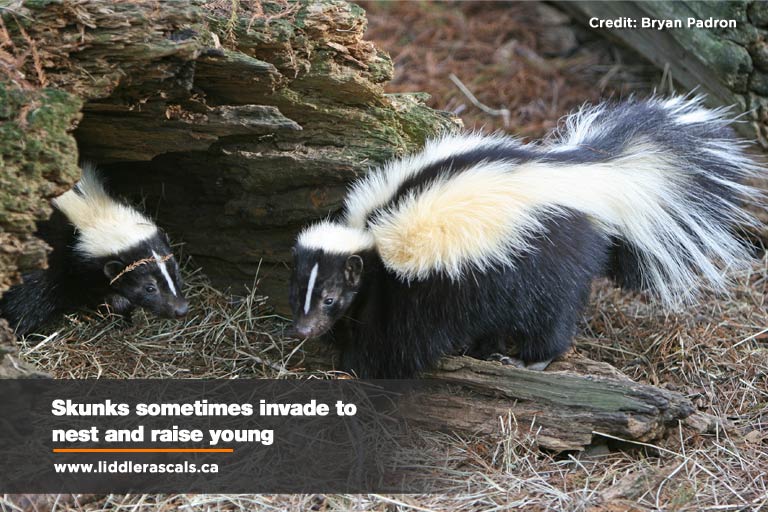
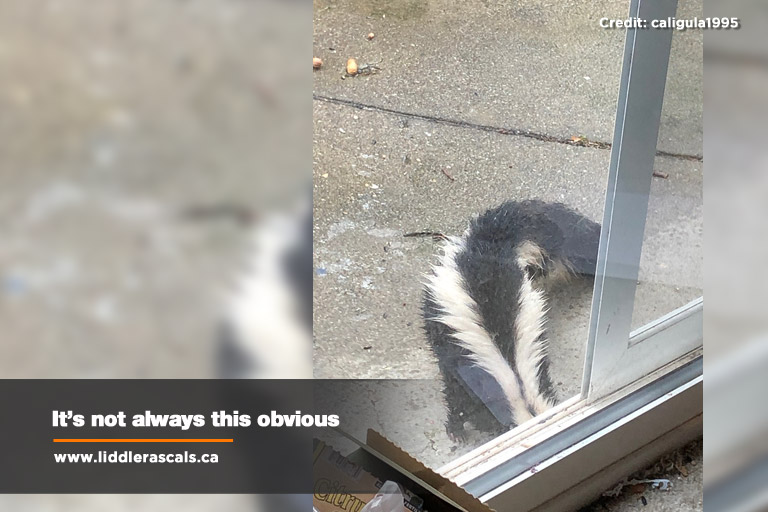
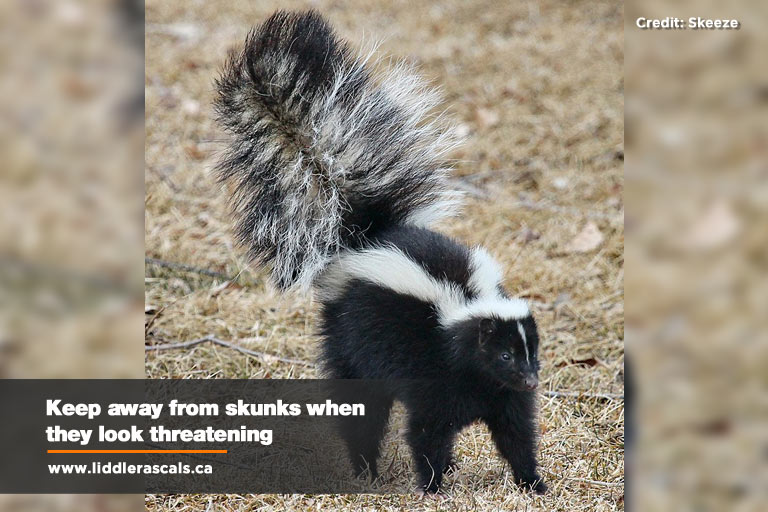
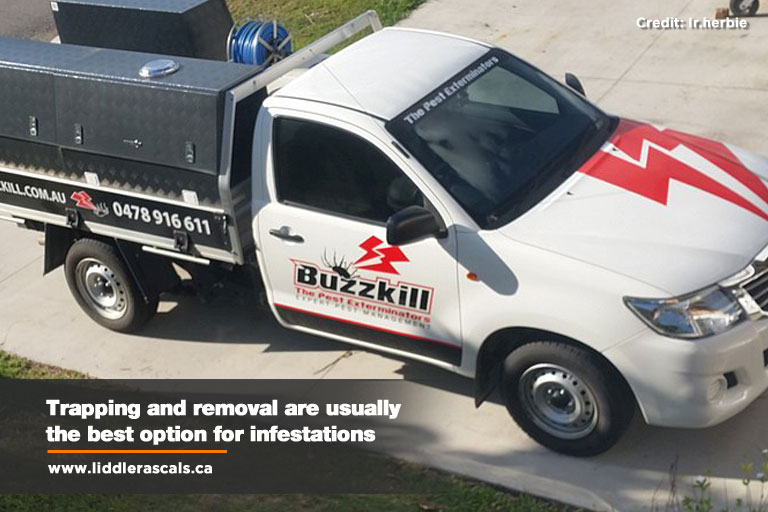
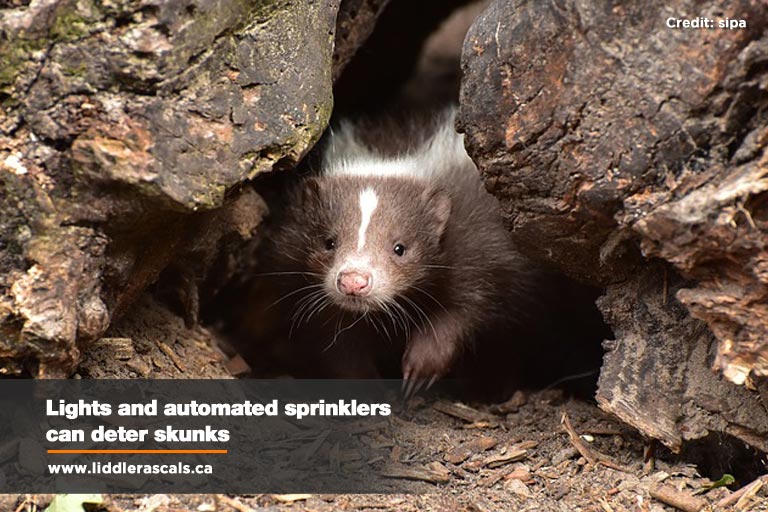
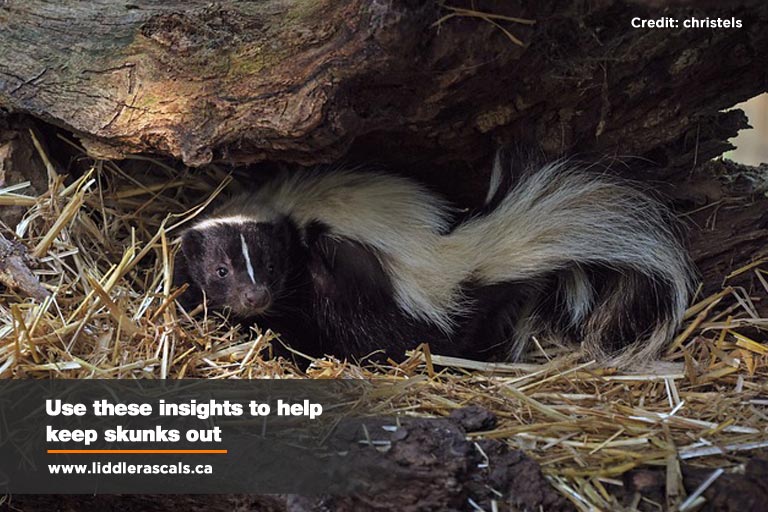
Leave a Reply
You must be logged in to post a comment.